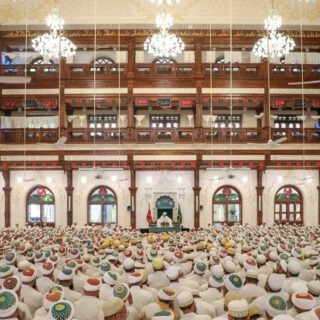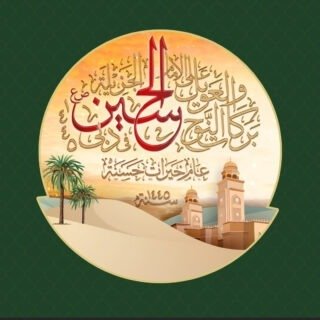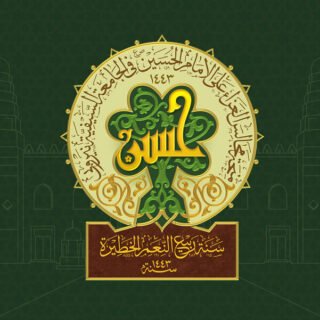بسم الله الرحمن الرحيم
Some say and write as above. Others write it as,
In the name of Allah, the Most Merciful, the Most Compassionate
While some write “786.” Be it in any form, it indeed has barakat.
بسم الله الرحمن الرحيم has 19 letters, as does the mubarak names of Panjatan PaakAS (محمد علي فاطمة حسن حسين) .
Letters of the mubarak name of our beloved Maula, Syedna عالي قدر مفضل سيف الدين are 19 too.
بسم الله الرحمن الرحيم is the first aayat of Surah al-Faatehah.
Reciting and writing بسم الله الرحمن الرحيم before and above everything is an integral part of Thaaqafat Fatemiyah.
Although بسم الله الرحمن الرحيم has to be recited every time we start an action, some of the acts before which Awliyaullah AS have specifically stressed upon reciting it, are:
- starting a meal
- taking a sip of water
- doing zabihat
- boarding any mode of transport
- entering a masjid
بسم الله الرحمن الرحيم is an eternal source of barakat. Awliyaullah AS have elaborately stated its meanings. Once Amirul Mumineen Maulana Ali AS started narrating the meanings entailed in بسم الله الرحمن الرحيم at dusk. At dawn he was still expressing the connotations of the nuqtah below the letter ب of بسم الله الرحمن الرحيم
Al-Dai al-Ajal Syedna Mohammed Burhanuddin RA once stated,
“Rasulullah SA has been specially selected by the Almighty to have بسم الله الرحمن الرحيم as faatehah (opening). Prior to him, Anbiyaa’ Kiraam AS too, had various other faatehah (means of opening a verse or statement). However, بسم الله الرحمن الرحيم has unfathomable meanings in it.”
The barakat of بسم الله الرحمن الرحيم can be understood through the following instances from Fatemi history:
- When Rasulullah SA invited forty individuals from Banu Abdil Muttalib, Maulana Ali AS prepared a goat’s limb and a bowl of milk as a meal for them. Rasulullah SA recited بسم الله الرحمن الرحيم and invited them to begin their Each of them ate and drank to his full. Whereas, the meal remained as it was, by the barakat of بسم الله الرحمن الرحيم recited by RasulullahSAW.
- On his way to Siffin from kufa, Amirul Mumineen Maulana Ali’s AS companions complained to him of their thirst and lack of any source of water available. Amirul Mumineen AS came near a big rock, recited بسم الله الرحمن الرحيم and lifted the rock as if it was a ball in his hand. To everyone’s wonder, a spring of fresh water flowed from beneath the rock. Everyone quenched their thirst and filled their vessels with as much water as they wished. Then Amirul Mumineen AS placed the rock back in its place.
- While seeing off his commander-in-chief al-Qa’id Johar on his expedition to conquer Misr, Imam Maulana Moiz AS ordered him saying, “March with the name of Allah and conquer.” Al-Qa’id Johar conquered Misr with the minimum of effort just as ImamAS had foretold.
- When His Majesty King Saud called upon Syedna Taher Saifuddin RA, a mumin gifted him with a بسم الله الرحمن الرحيم written by Syedna Taher Saifuddin RA. The king could not comprehend the reason behind this gift. Syedna Taher Saifuddin RA explained to him that the Bismillah had been written by him. The honourable guest instantly kissed the ‘alaamat sharifah (بسم الله الرحمن الرحيم) saying, “By Allah! It is indeed barakat.”
- Al-Dai al-Ajal Syedna Taher Saifuddin commenced the taalim of his revered son and mansoos, al-Dai al-Ajal Syedna Mohammed Burhauddin RA, in Udaipur with بسم الله الرحمن الرحيم
We, Mumineen are blessed to know and acknowledge the barakat of بسم الله الرحمن الرحيم. While we recite it unfailingly before our every action, we move our right palm over our face. This act has meaning beneath it. However, some unfortunate beings, Ibne Kawwa and his likes, fail to comprehend the barakat of reciting بسم الله الرحمن الرحيم before their meals. Neither do they pronounce it before their qira’at in their namaaz saying that Satan has stolen it. Their ill intentions deprive them of its barakat and they keep sensing uneasiness in their selves.
Our education commences with بسم الله الرحمن الرحيم. And whenever we recite it, it guarantees deliverance from hellfire for our parents and teachers who have taught us to recite it.
May Allah protect Fatemi Thaqaafat in our generations. May He grant our Maula, al-Dai al-Ajal Syedna Aali Qadr Mufaddal Saifuddin TUS the custodian of Fatemi Thaqaafat a long life till the day of Qiyaamat. Aameen.








